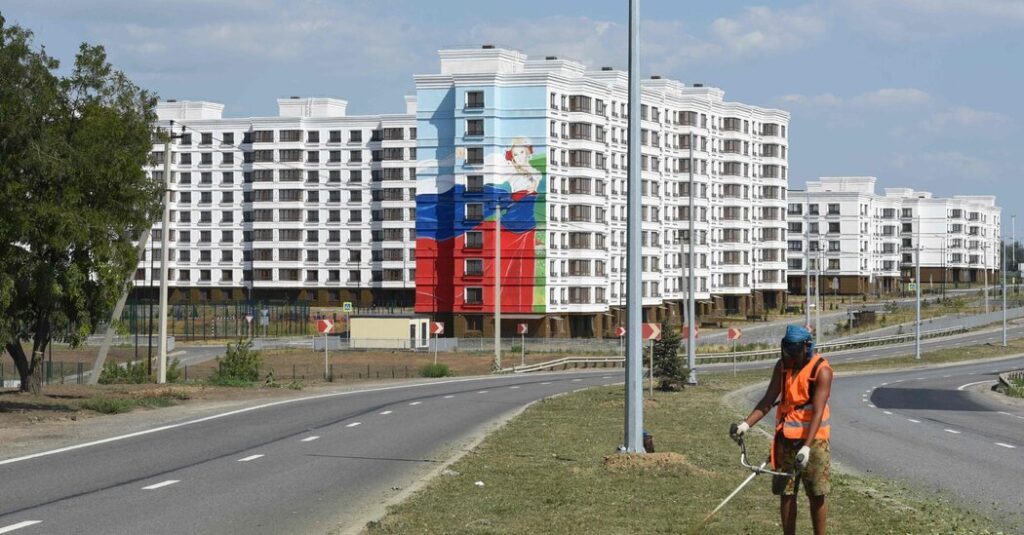Oleksandra Stolyar was living near Kyiv when she learned that her apartment in the occupied Ukrainian port city of Mariupol would be confiscated by the Russian-installed government.
The problem was that she, like tens of thousands of others, had fled war-torn Mariupol several years ago, and hadn’t re-registered her property because she didn’t become a Russian citizen. She considered the idea of taking a Russian passport morally repugnant.
“I had already bid farewell to my apartment, to the furniture, to all the stuff that I had there,” said Ms. Stolyar, a 46-year-old kindergarten music teacher, adding, “but I am sad that the life we had has been taken away from us.”
More than three years after Russian troops captured Mariupol in May 2022, after a brutal three-month siege, the Kremlin is pouring billions of dollars into remaking the city, constructing scores of sparkling new apartment buildings and rebuilding some neighborhoods.
But in interviews with 14 current or former residents of Mariupol, they offered a mixed picture of the reconstruction effort.
They said most Ukrainian residents could not afford the new apartments, which start around $100,000. The property of some others, like Ms. Stolyar’s, has been declared “abandoned” and confiscated. In video appeals posted online, groups of other residents say the Russian-installed city government has reneged on promises to distribute new housing to all those left homeless by the war.
In the interviews, some residents praised the changes, but others described the reconstruction as a “Potemkin village,” an ornamental facade camouflaging problems created by Moscow’s invasion, like a chronic water shortage.
“Despite all the construction going on, local people don’t see a holistic approach to the development of the city,” said Nikolay Osychenko, the former head of a Mariupol television station who now hosts a You Tube talk show from Kyiv. “They cannot see its future.”
Many of the residents interviewed spoke anonymously out of fear of arrest and other retribution from the authorities.
The media office for the Russian reconstruction effort did not respond to questions for this article. In May, to mark the third anniversary of Russia capturing Mariupol, the city administration told the government-run Donetsk News Agency that 1,200 apartment buildings had been restored, behind the target of 1,600.
“Literally everything in the city is being renovated — from the master plan to the dog shelter, from transport to bus stops, from the theater to city parks and beaches,” the statement said.
The 2022 siege devastated Mariupol. Up to 90 percent of residential buildings and 60 percent of private homes were damaged, according to a United Nations report. The estimated death toll, never confirmed, started in the thousands.
Before the war, the city’s population was more than 450,000. About half of its residents fled, with mainly older ones staying.
Capturing Mariupol was crucial for the Kremlin’s war strategy. The second-largest city in southeastern Ukraine, it anchors the land bridge linking Russia to Crimea, the Black Sea peninsula that Russia seized in 2014.
The city was once a Soviet industrial archetype. The Azovstal Iron and Steel Works plant, established in 1930, dominated the skyline and occupied almost six square miles of prime shoreline along the Sea of Azov, limiting beach access, fouling the water and belching black smoke.
Azovstal and a second gargantuan steel plant, as well as the port, drove the economy, providing greater prosperity relative to most of Ukraine.
“Many people complained that the factories were polluting the air, but it was home,” said Natalya Svidlova, who abandoned her specialty coffee and tea stores to move to Odesa but hoped to return.
The city also carries important symbolic weight as part of Novorossiya, or New Russia, lands that Empress Catherine the Great took from the Ottoman Empire in the 18th century, and therefore territory that President Vladimir V. Putin considers historically part of Russia.
Like most Kremlin megaprojects, the reconstruction has a huge, opaque budget with little public accounting, creating the opportunity for corruption. Timur Ivanov, a deputy defense minister, received a 13-year prison sentence in July for corruption, including accepting bribes from a construction firm heavily involved in Mariupol.
On top of the vast sums already spent, analysts estimate that $4 billion is earmarked for Mariupol in the coming three years.
Before the invasion, City Hall commissioned a future architectural vision, Mariupol Reborn. It conjured up a green tech hub, with the city’s two rivers and seafront joined in a sweep of coordinated development, including converting the labyrinthine train tracks used to transport steel into bike paths. A new master plan created in Moscow borrows from Mariupol Reborn, while keeping much of the city as it was previously.
Some heavily damaged landmark structures have been restored. The Drama Theater — hit by a Russian airstrike despite being marked by a giant sign saying “children,” while hundreds of civilians sheltered in its basement — will soon reopen.
Russian teams are removing unexploded ordnance from the Azovstal plant, once the last redoubt of the Ukrainian armed forces.
The most striking change is what some residents call the “Russification” of Mariupol. Russia’s tricolor flag is ubiquitous, while Ukrainian monuments have all been dismantled.
A giant banner covering the side of one downtown building depicts a sun-dappled mother and her son with text that reads, “May 20, 2022. Liberation Day.” One resident who survived the shelling by living underground for weeks said that calling the Russian occupation “liberation” was “shocking.”
Hundreds of Ukrainian soldiers became national heroes by holding out in the warren of tunnels beneath the Azovstal plant for more than two months. But near the plant, Azovstal Street was renamed Tula Avenue after a Russian city aiding reconstruction, and city authorities installed a huge, brassy statue of a samovar and a gingerbread cake, symbols of Tula.
“They are trying to erase the history of the resistance by changing the name of the street,” said Mr. Osychenko, the former television station head.
The reconstruction sends a deliberate ideological message both internally and internationally, according to Ilia Shumanov, a board member for Russia of Transparency International, which tracks political corruption globally. “This project is the symbol of a newborn Ukraine,” he said.
Russia bars some former residents from returning. Ukrainians can enter legally only by first flying to Sheremetyevo International Airport in Moscow, where those who fail ideological screening over their attitude toward Russia find themselves banned from entry to Mariupol for a decade or more and often lose their apartments, residents said.
Property rights have become a significant hurdle. By changing many street names and building numbers, the authorities have rendered Ukrainian property deeds invalid, the residents said, so owners in the former buildings cannot try to claim apartments in the replacements.
Ms. Svidlova, for example, fears her apartment at 65 Kuprina Street is gone for good. After the building, shattered by shelling, was demolished in late 2022, a poster went up advertising a new tower at 65A Kuprina Street. Construction has yet to begin.
The city has also gradually changed its approach — going from pledging new apartments on the same location to promising apartments somewhere in the city to leaving people in limbo. Residents who accept Russian compensation receive a pittance, homeowners said.
Meanwhile, apartment buyers, usually Russians, get a government-subsidized 2 percent mortgage, far lower than the 22 percent rate in most of Russia.
“Those who waited and insisted that they want to live where they lived before are still wandering around,” Ms. Svidlova said. “No one offers them anything anymore.”
Some residents displaced from downtown received apartments in the new Nevsky neighborhood on Mariupol’s outskirts, which includes 12 five-story buildings and a nearby hospital. Mr. Putin toured the neighborhood in 2023 to showcase reconstruction efforts.
Yet problems persist there. The area is ill-served by public transportation, residents said, and the hospital lacks medical staff, a shortage throughout Mariupol.
Still, the reconstruction effort has fans. Nikolai, a video blogger who uses only one name, lauded the fact that what he considered a drab Soviet downtown had been gradually disappearing. He highlights changes like a new McDonald’s knockoff — Mak Fly — resembling a 1950s American diner. He also noted lingering problems, like packs of stray dogs attacking pedestrians and neighborhoods of private homes that still look “apocalyptic.”
During the siege, residents killed by shelling were often buried in makeshift graves wherever they fell. Now, construction crews sometimes unearth human remains.
The woman battling for her apartment said a corpse in the neighboring garden had stunk for weeks, and she feels that she can still smell it. “When I left Mariupol, I cried every morning over what I had left behind,” she said. “When I went back, I cried every morning because of what I saw.”
Neil MacFarquhar has been a Times reporter since 1995, writing about a range of topics from war to politics to the arts, both internationally and in the United States.
The post In Russian-Occupied Mariupol, Everything Ukrainian Must Go appeared first on New York Times.




